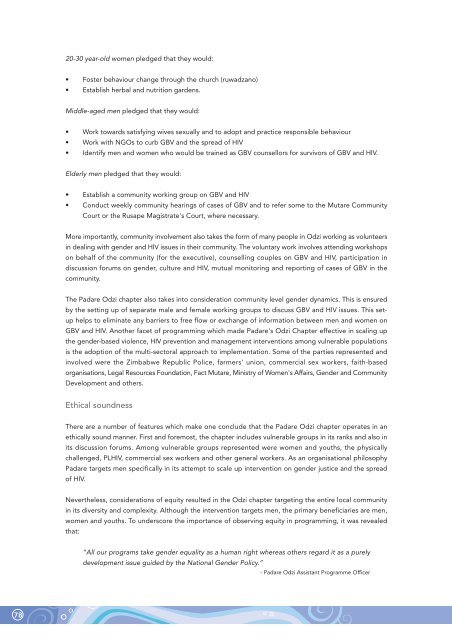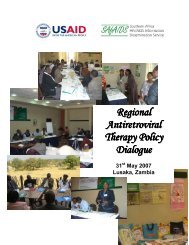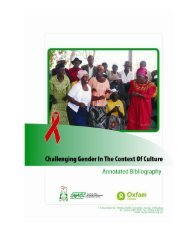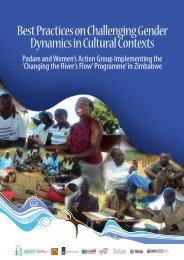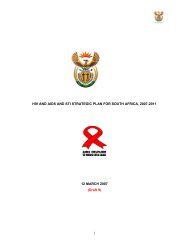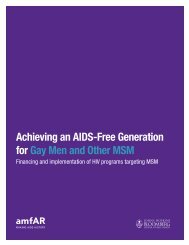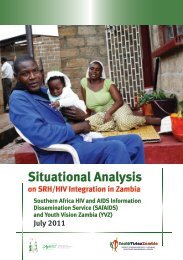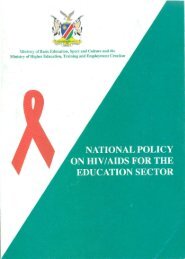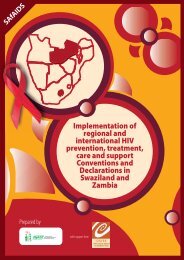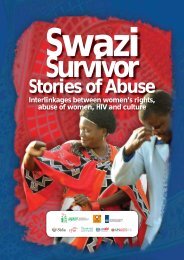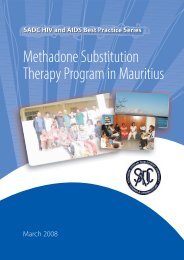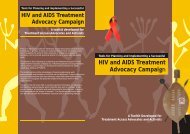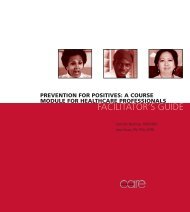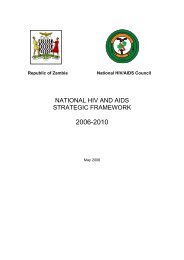Zimbabwean stories of "Best Practice" - SAfAIDS
Zimbabwean stories of "Best Practice" - SAfAIDS
Zimbabwean stories of "Best Practice" - SAfAIDS
You also want an ePaper? Increase the reach of your titles
YUMPU automatically turns print PDFs into web optimized ePapers that Google loves.
20-30 year-old women pledged that they would:• Foster behaviour change through the church (ruwadzano)• Establish herbal and nutrition gardens.Middle-aged men pledged that they would:• Work towards satisfying wives sexually and to adopt and practice responsible behaviour• Work with NGOs to curb GBV and the spread <strong>of</strong> HIV• Identify men and women who would be trained as GBV counsellors for survivors <strong>of</strong> GBV and HIV.Elderly men pledged that they would:• Establish a community working group on GBV and HIV• Conduct weekly community hearings <strong>of</strong> cases <strong>of</strong> GBV and to refer some to the Mutare CommunityCourt or the Rusape Magistrate's Court, where necessary.More importantly, community involvement also takes the form <strong>of</strong> many people in Odzi working as volunteersin dealing with gender and HIV issues in their community. The voluntary work involves attending workshopson behalf <strong>of</strong> the community (for the executive), counselling couples on GBV and HIV, participation indiscussion forums on gender, culture and HIV, mutual monitoring and reporting <strong>of</strong> cases <strong>of</strong> GBV in thecommunity.The Padare Odzi chapter also takes into consideration community level gender dynamics. This is ensuredby the setting up <strong>of</strong> separate male and female working groups to discuss GBV and HIV issues. This setuphelps to eliminate any barriers to free flow or exchange <strong>of</strong> information between men and women onGBV and HIV. Another facet <strong>of</strong> programming which made Padare's Odzi Chapter effective in scaling upthe gender-based violence, HIV prevention and management interventions among vulnerable populationsis the adoption <strong>of</strong> the multi-sectoral approach to implementation. Some <strong>of</strong> the parties represented andinvolved were the Zimbabwe Republic Police, farmers' union, commercial sex workers, faith-basedorganisations, Legal Resources Foundation, Fact Mutare, Ministry <strong>of</strong> Women's Affairs, Gender and CommunityDevelopment and others.Ethical soundnessThere are a number <strong>of</strong> features which make one conclude that the Padare Odzi chapter operates in anethically sound manner. First and foremost, the chapter includes vulnerable groups in its ranks and also inits discussion forums. Among vulnerable groups represented were women and youths, the physicallychallenged, PLHIV, commercial sex workers and other general workers. As an organisational philosophyPadare targets men specifically in its attempt to scale up intervention on gender justice and the spread<strong>of</strong> HIV.Nevertheless, considerations <strong>of</strong> equity resulted in the Odzi chapter targeting the entire local communityin its diversity and complexity. Although the intervention targets men, the primary beneficiaries are men,women and youths. To underscore the importance <strong>of</strong> observing equity in programming, it was revealedthat:“All our programs take gender equality as a human right whereas others regard it as a purelydevelopment issue guided by the National Gender Policy.”- Padare Odzi Assistant Programme Officer78


